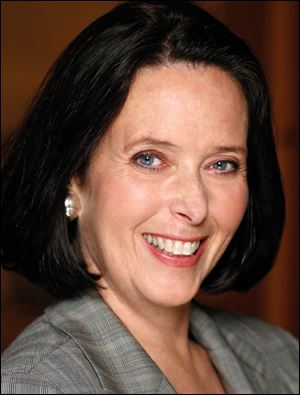
Workshop in Toledo to offer fund-raising advice for nonprofits
5/18/2012
Penelope Burk, president of Cygnus Applied Research Inc., will be in Toledo Wednesday.
Penelope Burk is used to shocking her audiences, but she insists that's not her intent.
The author of Donor-Centered Fundraising, Ms. Burk likes to challenge not-for-profit organizations to rethink the way they raise money. Her approach is to place more emphasis on keeping donors than trying to attract new ones, to reward all donors with gratitude and respect -- not just the high-dollar contributors -- and to let prospective board members know up front that asking for money will be an important part of the job.
"It is totally common sense and people who aren't in the fund-raising business get it instantly," Ms. Burk said in a phone interview from her Hamilton, Ont., office. "It's not that fund-raisers are not very smart and they don't understand, it's just that fund-raising over decades has evolved into a certain combination of processes and procedures, and donor-centered fund-raising is different."
Ms. Burk, president of Cygnus Applied Research Inc., will be in Toledo on Wednesday to give a workshop on "The Donor-Centered Board" at the McMaster Center at the Toledo-Lucas County Public Library's Main Library. Her appearance is sponsored by the Center for Nonprofit Resources in partnership with the Agency Directors' Association and the Association of Fund-raising Professionals' Northwest Ohio chapter.
"[Ms. Burk] brings a wealth of experience and is internationally recognized for challenging long-standing but ineffective fund-raising practices," said Kate Smith, associate director of the Center for Nonprofit Resources. "Fund-raising assistance is one of the center's most requested services; we hope that our community of nonprofit professionals and board members will benefit from Ms. Burk's evidence-based fund-raising methods."
Ms. Burk, who has worked in not-for-profit management, fund-raising, and research for more than 40 years, bases her training programs on research her company has conducted the last 15 years. Surveying donors regularly has given her insight into the people writing the checks -- or not.
Their responses often suggest that nonprofits are going at things the wrong way.
"I don't challenge [accepted practices] just for the sake of riling up the industry I'm a part of," she said. "I only do that when the evidence speaks in another direction, and I hope that I give the fund-raising industry full and due credit for all they do accomplish. One big difference in the company I run is that we take our cue from donors, and if they in significant, majority numbers go in one direction where fund-raising practice tends to go in another, then we point that out. We point that out and say, 'Here's the solution.' "
One message donors told her company clearly after the recession began squeezing their wallets was that they wanted to support charitable organizations, but they wanted to know their money was helping the cause, not paying for excessive mailings or showy fund-raising events.
"We surveyed over 25,000 Americans in February, 2009, and asked them what their plans were for philanthropy, what concerned them, and what advice they could offer," Ms. Burk said. "Eighty-seven percent said they'd been hurt in a significant way, but 55 percent of them said they'd find a way somehow to give the same or more than the previous year. The No. 1 reason they gave was that despite how things were going for them, there are people out there who need help even more."
In that survey and those conducted subsequently, donors said they were very mindful of an organization's cost per dollar raised. She also found that today's donors are far more likely to give bigger gifts to fewer organizations because they want to know their donation will make an impact.
As she will be discussing in Toledo next week, Ms. Burk said board members can and should play a critical role in fund-raising. Organizations should not seek board members who are unwilling or uneasy about that role.
"We asked donors what would you find to be irresistible even in a recession as far as giving choices are concerned?" she said. "One of two things that was prominent was if someone on the board asked me to give. Board members are so influential to donors."
Registration for the workshop begins at 8:45 a.m. with the session running from 9 a.m. to 12:30 p.m. The cost is $50. For more information, go to c4npr.org.
Contact Jennifer Feehan at: jfeehan@theblade.com or 419-724-6129.